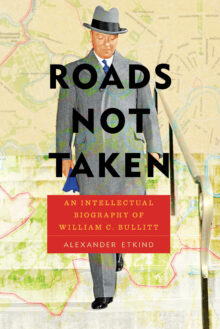
Alexander Etkind
Alexander Etkind is professor of history at the European University Institute in Florence, Italy. He previously taught at the European University at St. Petersburg, Russia, and at Cambridge University, where he was a fellow of King’s College and professor of Russian literature and cultural history. He is the author of numerous books, including, most recently, Warped Mourning: Stories of the Undead in the Land of the Unburied and Internal Colonization: Russia’s Imperial Experience.
Roads Not Taken
An Intellectual Biography of William C. Bullitt
A journalist, diplomat, and writer, William Christian Bullitt (1891-1967) negotiated with Lenin and Stalin, Churchill and de Gaulle, Chiang Kai-shek and Goering. He took part in the talks that ended World War I and those that failed to prevent World War II. While his former disciples led American diplomacy into the Cold War, Bullitt became an early enthusiast of the European Union. From his early (1919) proposal of disassembling the former Russian Empire into dozens of independent states, to his much later (1944) advice to land the American troops in the Balkans rather than in Normandy, Bullitt developed a dissenting vision of the major events of his era. A connoisseur of American politics, Russian history, Viennese psychoanalysis, and French wine, Bullitt was also the author of two novels and a number of plays. A friend of Sigmund Freud, Bullitt coauthored with him a sensational biography of President Wilson. A friend of Bullitt, Mikhail Bulgakov depicted him as the devil figure in The Master and Margarita. Taking seriously Bullitt’s projects and foresights, this book portrays him as an original thinker and elucidates his role as a political actor. His roads were not taken, but the world would have been different if Bullitt’s warnings had been heeded. His experience suggests powerful though lost alternatives to the catastrophic history of the twentieth century. Based on Bullitt’s unpublished papers and diplomatic documents from the Russian archives, this new biography presents Bullitt as a truly cosmopolitan American, one of the first politicians of the global era. It is human ideas and choices, Bullitt’s projects and failures among them, that have brought the world to its current state.

